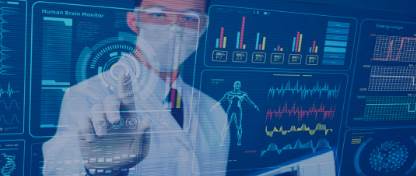Deep learning, machine learning, and artificial intelligence can handle enormous amounts of medical data. The healthcare sector can benefit from the insights provided by these structured and unstructured data. Today, the foundation of medical diagnosis and therapy is machine learning. The concept of disease prognosis is being redefined in healthcare by machine learning. To determine the root causes of the issues, ML algorithms analyze scans and other diagnostic procedures. It has helped treat illnesses and develop novel treatments.
Anomalous Finding
There is a need to recognise and report medical issues or linguistic faults in the healthcare industry. Machine learning methods aid in the early detection of anomalies and health issues. The sensor-embedded health tracking gadgets provide ongoing health monitoring of users. Effective image analysis enables the identification of particular anomalies. The abnormality analysis can then be prioritized, saving time and enhancing patient care. By detecting any irregularities in patterns, anomaly detection helps reduce health insurance fraud.
Automated Surgery
Surgery results are improved via machine learning. It examines the preoperative information and suggests fresh strategies to lessen potential difficulties. Around 100 robotic surgical systems are present in 70,000 hospitals in India. This is a step in the direction of healthcare adopting the cutting-edge approach.
Dosage precision
The procedure of determining a patient's dosage needs is exact. It adheres to several rules and presumptions derived from clinical trials. Dosing of medications using AI is becoming increasingly common among modern healthcare providers. The patient's own shown response to the drug is taken into account in this customized service. The work on dosage precision aids in bettering patient outcomes, particularly in illnesses that are chronic.
Virtual Assistance in Healthcare
Virtual Assistance in Healthcare\sAI-virtual nursing assistants determine the health of patients. These VAs evaluate symptoms and provide prognostic medication. The number of unnecessary hospital visits has decreased, and specialists are spending less time on these issues.
Healthcare Management That Is Effective
2020's first half saw the global spread of COVID-19.Calls to healthcare centers asking for information started to significantly rise. These healthcare institutes used ML to increase agent efficiency due to an increase in calls. Through automation, machine learning handles an unexpectedly large volume of calls.
The price of running a healthcare system is very significant. Machine learning substantially helps to enhance current flaws and workflows. It facilitates the reduction of time-consuming chores like ordering testing or medicines. Specialists may now concentrate on their work on important issues thanks to this automation.
Recognition of Infectious Cells
Biopsies are used by surgeons to determine which tissue should be removed during cancer therapies. As a result, it is vital to identify and analyze sick cells. The diagnosis of diseases has been transformed by deep learning algorithms, automated image analysis, and data mining.
Eliminate Diseases
Thanks to the Internet of Things and the use of health applications, machine learning and AI have advanced exponentially in the field of healthcare. With the assistance of these gadgets, people can spread out their medical visits and maintain their health. These programmes are helpful in helping doctors comprehend the typical patient behavior.
Greater Safety in Surgical Operations
More than 230 million surgical procedures have been performed worldwide, according to WHO. Of them, 14% or so of patients report negative effects. Experts advise using quick surgical feedback to improve this. This involves regular technical skill development, which lowers errors by 50%.
Control of Hospital Infections
AI and machine learning help hospitals reduce infection. Healthcare facilities must manage hospital infection control given the severity of COVID-19. A key requirement is the creation of predictive models for bacteria, viruses, and other infection-causing organisms. This method can anticipate patient population weaknesses and prevent infections.
Conclusion
Systems are currently faced with the choice of providing better services at lower prices in the shortest amount of time. To create more accurate and effective medicines, the healthcare sector must optimize its research. Target therapies that allow fewer side effects and save more lives are essential if high standards of healthcare are to be upheld.




Leave Comment
2 Comments